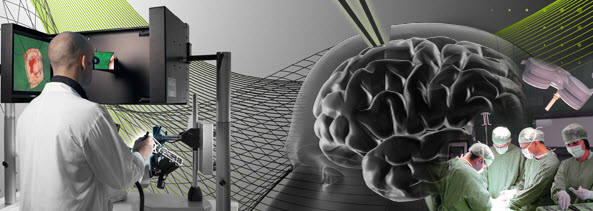This article, which I found on the Kuzweil site, is an education and training simulation system built in Canada and now used in Canadian medical centres for teaching. I don't know if this kind of health technology is classified as eHealth, but I thought the area of medical professional and student training in health technology a real part of health informatics. Health Technology Assessment is almost a branch of science itself. It is kind of the clinical trial process for health technology, before it comes to market, safe for human consumption.
Virtual-reality simulator helps teach surgery for brain cancer
NeuroTouch system provides 3D graphics and tactile feedback during simulated brain surgery
September 24, 2012
A new virtual-reality simulator — including sophisticated 3D graphics and tactile feedback — provides allows neurosurgery trainees to practice essential skills and techniques for brain cancer surgery.
The prototype system, called “NeuroTouch,” uses 3D graphics and haptic (sense of touch) technology to provide a realistic look and feel for practice in performing common tasks in brain cancer surgery. Lead author Sébastien Delorme, PhD, of the National Research Council Canada and colleagues believe the NeuroTouch system could enhance “acquisition and assessment of technical skills” for neurosurgeons in training.
The NeuroTouch software simulates what the neurosurgeon sees through the operating microscope during surgery — including detailed, lifelike renderings of brain tissue, blood vessels, and tumors. The system also includes haptic tool manipulators, providing tactile feedback similar to what the surgeon would feel during surgery. The simulator runs on computers that are similar to those used to run popular games.
The surgical tasks were developed using 3D reconstructions of MRI scan data from actual patients. With further development, the system could also allow neurosurgeons to simulate and practice actual operations, based on the patient’s own MRI scan.
During the development process, the researchers received feedback through an advisory network of teaching hospitals. The 3-D visual graphics received high praise, although the tactile feedback system came in for more criticism. Surgeons testing the system also suggested improvements to the ergonomics of using the simulator.
Neurosurgical residency training programs are challenged to make the most of their resources while maximizing training opportunities for residents. About 90 percent of surgical training is received in the operating room, where residents learn procedures by assisting surgeons with hundreds of operations.
Medical simulators — similar to those used to train airline pilots — are increasingly viewed as a cost-effective complement to traditional surgical training. For example, a commercially available simulator has proven effective in helping trainees perform minimally invasive gallbladder surgery more rapidly, with a lower risk of patient injury.
The NeuroTouch system appears to be a promising tool for extending virtual reality technology to teaching common and important neurosurgery techniques. While it is not the first neurosurgical simulator, it provides key advances over previous systems, particularly in terms of providing real-time graphics and tactile feedback.
The next step will be to evaluate the new system in actual neurosurgical training programs. “First generation NeuroTouch prototypes have been set up in 7 teaching hospitals across Canada, to be used for beta testing and validation and evaluated for integration in a neurosurgery training curriculum,” according to Dr. Delorme and colleagues, and a new generation of NeuroTouch simulators is currently being deployed worldwide.



No comments:
Post a Comment